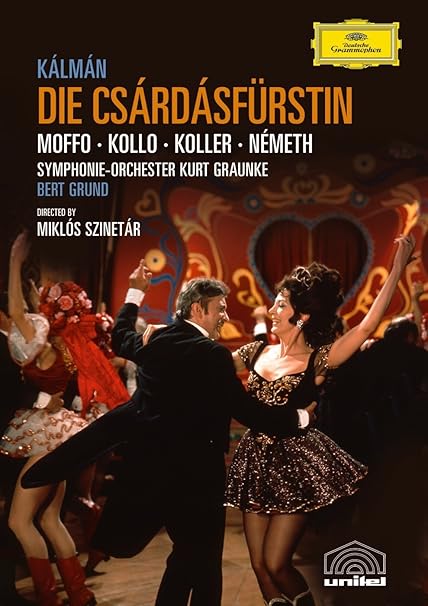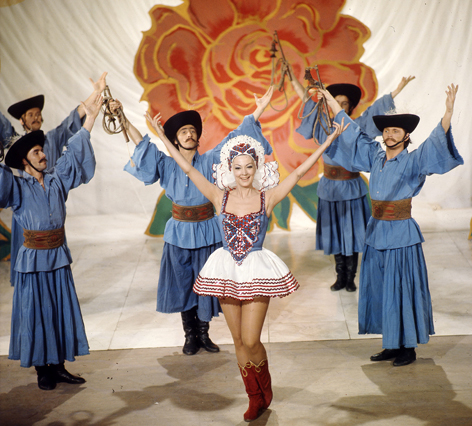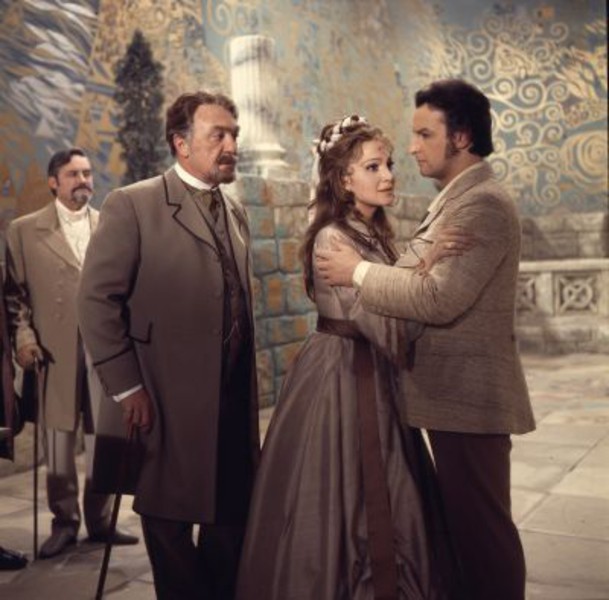Eine Nacht in Venedig
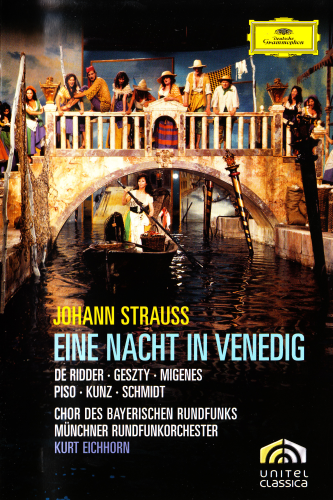
I have now watched another Strauss II operetta -- Eine Nacht in Venedig (A night in Venice). The piece premiered in 1883. It is said to be one of Strauss's three most recognisable stage works alongside Die Fledermaus and Der Zigeunerbaron so I have now watched all three. The setting is in the eighteenth-century. The performance I watched was a 1973 one directed by Václav Kaslík. It was a cinematic version using resources from Munich.
I read: "Late in 1881 Strauss began discussing a new operetta with F. Zell (pen name of Kamillo Walzel, 1829-1899) and Richard Genée (1823-1895). Walzel created the dialogue and Genée the song texts. Eine Nacht in Venedig received its première at the new Friedrich-Wilhelmstädtisches Theater in Berlin on October 3, 1883".
The story
The show is undoubtedly a classic farce -- worthy of Feydeau. It was particularly good in the second half, with a kaleidoscope of improbable and amusing happenings.
It's basically about infidelity, with the men being lecherous but the ladies triumphing in the end. Infidelity has of course long been a theme in opera and operetta. There is a lot of potential for laughs in it. And this show is certainly light-hearted, making full use of absurdity for comic effect. A good scene was when the fat old ladies accosted the duke in his bath.
The music is good, the singing is good, the acting is good and the ladies are good-looking but I didn't really like the plot. It involved constant lying to women, which I abhor. Women hate being lied to and I just don't do it. Women will put up with a lot as long as they trust the man concerned. And I have probably got away with more by being honest than I would have done by lying. I could give examples but that might be too much information.
And I don't claim any great virtue by being honest. It is just how I am made. By lying you are admitting that someone else's value system is superior to your own. And I don't do that. My Presbyterian upbringing probably contributes a little too. I remember being given a good grounding in the Ten Commandments at Sunday school during my childhood: "Thou shalt not bear false witness ..." etc.
The casting
I didn't much like Anton de Ridder as the Duke. He didn't look manly enough for that role in my view. Though that is arguable, of course. And his song Treu sein, das liegt mir nicht ("Being faithful does not suit me) did not endear him to me. I was rather reconciled to him when I found that he did not get the girl, however. He was a good singer, anyway.
The actors did a generally good job of acting Italian. I could at one point have sworn that "Caramello" was Neapolitan. He even sang German with an Italian accent at times. But the singer concerned is "Jon Piso", who was born in 1926 in Brasov, Romania. Both Romanians and Italians are descended from the Romans of old so they could have a lot in common. Piso was a powerful tenor, anyway, with his gondolier aria (Komm in die Gondel, mein Liebchen) being notable. There was a lot of good Strauss music in the show but that was probably the highlight.

One of the opening scenes -- of "Pappacoda", the macaroni cook, singing "Makkaroni, Makkaroni di Napoli!"
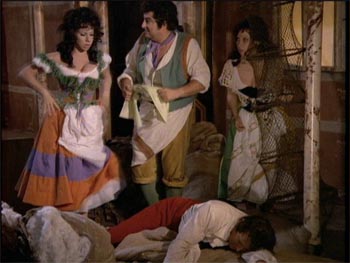
Pappacoda negotiating with Ciboletta
Italian gestures are a language of their own and after seeing "Pappacoda" (the macaroni cook) in action, I thought: "That guy has GOT to be Italian". And it seems he is, sort of. The singer was Cesare Curzi who was born on 14 October 1926 in San Francisco, California, of an Italian father who was also an operatic singer. His father must have been a good role-model across the board.
Erich Kunz does his elderly role well, as usual, and the ladies filled their push-up bras well. Push-up bras in the 18th century? It's an anachronism but a forgiveable one. Julia Migenes as "Ciboletta" was particularly admirable in that department. And Sylvia Geszty played the "Annina" role well. "Ciboletta", incidentally, is the Italian name for chives (Schnittlauch in German).

Annina the fisher girl (Sylvia Geszty)
Other details
I didn't much like the occasional photographic tricks using distorted images the first time around but I saw the point of them as representing dreams the second time around.
The "Pellegrina, rondinella" episode requires a bit of background. It is an early 19th century sentimental Italian poem meaning "Pilgrim swallow". It is said to be the most famous ballad of Italian Romanticism. Strauss set it in his own way for the show but there are other settings. The idea of the poem seems to be that the swallow is free to fly off after his mate but the speaker of the poem cannot. The words are here if that summary is inadequate, which it may be. The point of Annina singing it seems to be that she is describing him as a migrating swallow -- i.e. unable to stick with one woman.
Why paper aeroplanes (if that is what they are) are aimed at "Caramello" by "Annina" during the episode I have not yet figured out. There seems to be nothing online to enlighten me. For this show I seem to be "It".
Why the Duke sings "ninana ninana" repetitiously in order to seduce his ladies is also obscure. It means nothing in German but my Dizionaria tascabile di Mondadori does however offer some enlightenment. It is apparently an Italian word for "lullaby"!
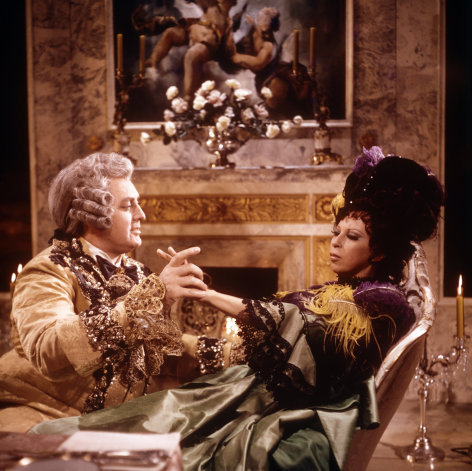
The Duke, trying it on with "Annina"
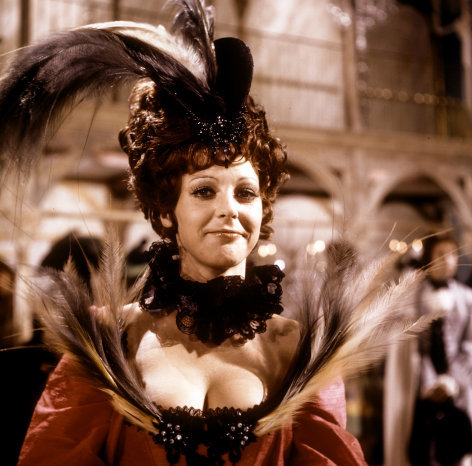
Trudeliese Schmidt (Barbara).
A slight oddity is that the music is thoroughly Viennese. I guess Strauss could write no other. But the setting is after all in Italy and Italy has rich musical traditions so it seems a slight pity that some actual Italian or at least Italianate music was not included at some points. But it is still a bit odd to hear very Italian-looking people speaking German. They even give a cheer as Hoch at one point. I guess Forza was a bit much to expect.
The reason an Austrian operetta was set in Italy would seem to be a perception that morality is looser in Italy than it is in Austria. I think that is only partly true. Italy just has different implicit rules, I think. For instance, a man may have a mistress but he is still expected to be a good family man at the same time -- being congenial to the relatives, providing for his wife, caring for his children etc.
Even Italy's great Fascist beast, Benito Mussolini, who definitely did have a mistress (they were executed together), would spend the night in a vigil beside the bed of his children if they were seriously ill: "Just like any Italian man", as Signora Mussolini said later. I have always liked Italians. I grew up in a place (Innisfail) where there were a lot of them. So perhaps I understand them too.
But there was a lot happening in the operetta and most of the participants ended up getting what they wanted so the expected ending -- with two happy couples set for matrimony -- was provided.
Most of the show seems to be online here but the resolution is poor. Good for the music, though.
